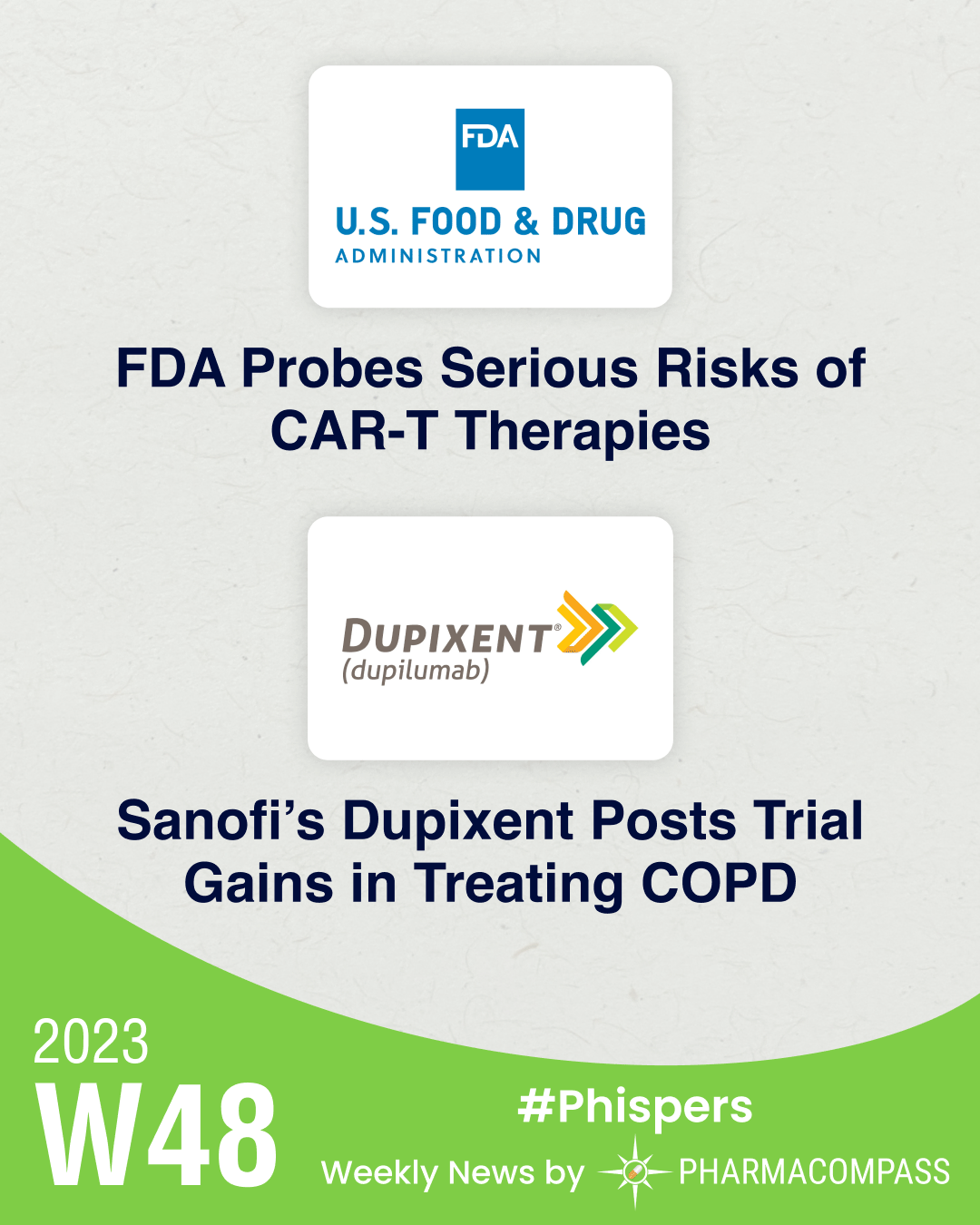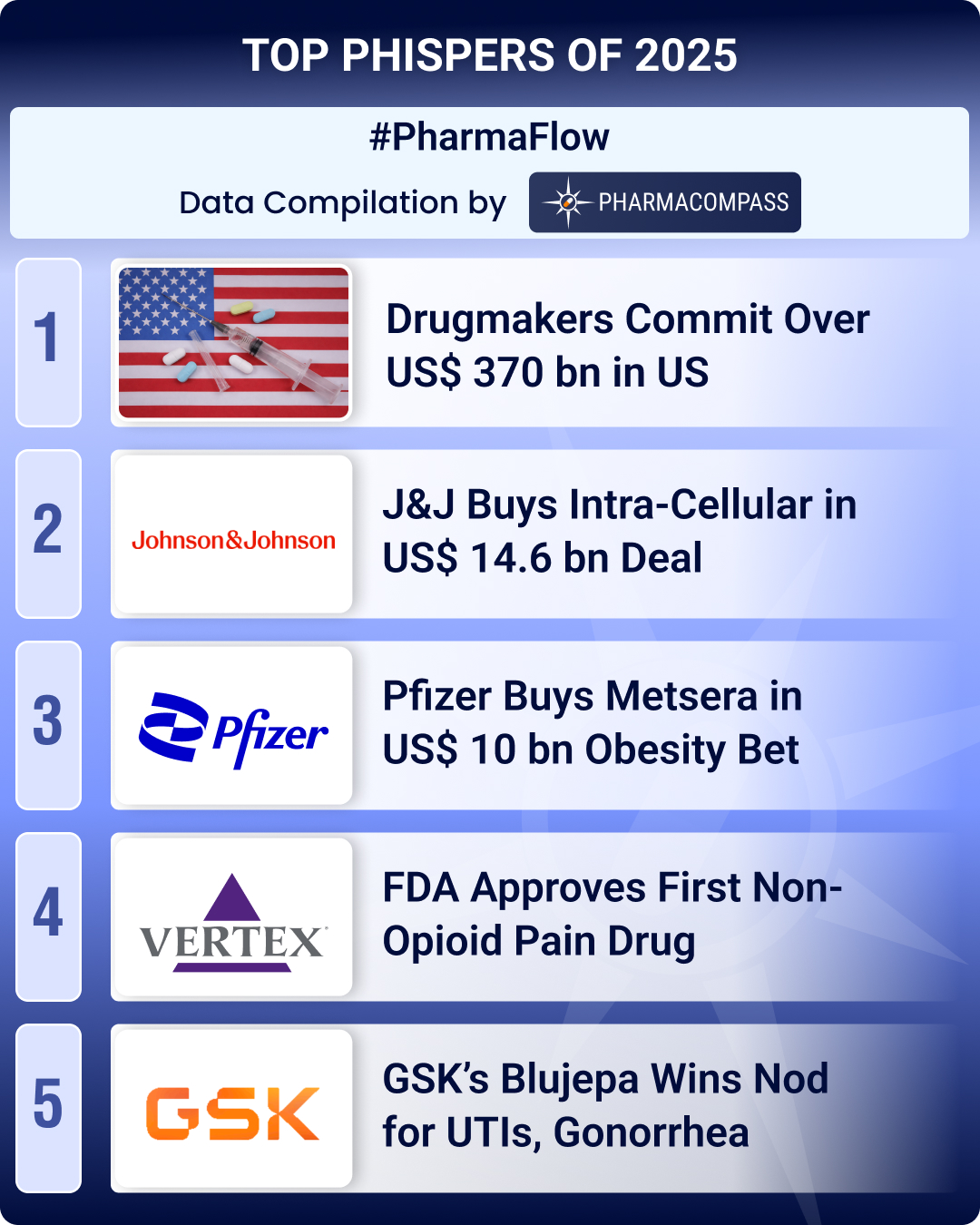
By PharmaCompass
2023-11-30
Impressions: 1,497 Article || 3 Video
Since 2017, chimeric antigen receptor T-cell (CAR-T) therapies have made headlines and raised hopes of patients suffering from various kinds of cancer, including blood cancer and lymphomas. But now, a note issued by the US Food and Drug Administration (FDA) says these therapies could carry a serious risk of developing secondary blood cancer.
In approvals, FDA has approved SpringWorks’ Ogsiveo to treat non-cancerous rare tumors, known as dermoid tumors. The agency has also approved an oral device from Vivos Therapeutics to cure severe obstructive sleep apnea (OSA).
In trial news, Sanofi’s Dupixent displayed “overwhelming positive efficacy” in a second, large phase 3 trial for the treatment of chronic obstructive pulmonary disease (COPD), and GSK announced that its therapy Blenrep has reached the primary goal of arresting progression of blood cancer in a late-stage trial.
Novartis has raised its annual sales growth target to 5 percent through 2027 due to rising demand for its innovative products. Novo Nordisk will invest US$ 2.3 billion in a site in Chartres, France, to boost the production of its blockbuster diabetes and weight-loss drugs — Ozempic and Wegovy.
And, in regulatory news, FDA has issued a warning letter to Intas’ Gujarat facility in India for violations of current good manufacturing practices (cGMPs).
FDA probes ‘serious risk’ of secondary blood cancer post use of CAR-T therapies
FDA is investigating a “serious risk” of cancer patients developing secondary blood cancer after undergoing CAR-T therapies introduced by companies like Novartis, Johnson & Johnson and Gilead Sciences. These therapies involve extracting the patient’s disease-fighting white blood cells (T-cells), doctoring them to fight the cancer, and infusing them back into the patient’s body.
Since 2017, FDA has approved six such therapies to treat blood cancers like lymphomas and some types of leukemia. Reports of adverse events received by FDA show some patients have been hospitalized or have died post these CAR-T therapies, resulting in a need for evaluating their risks.
Overall, FDA, clinicians and experts agree that the benefits of these gene therapy products, which come with a class warning label, outweigh the risks. The incidence of such secondary cancers is low — only 20 such cases are being tracked, out of the tens of thousands who have been treated with these therapies.
Sanofi’s Dupixent shows benefit in treating COPD in phase 3 trial; to seek FDA nod
Sanofi plans to seek FDA approval this month to expand monoclonal antibody Dupixent’s use as a treatment of chronic obstructive pulmonary disease (COPD), after the drug showed “overwhelming positive efficacy” in a second, large phase 3 trial. If approved, it would be the first biologic to treat the disease and catapult Dupixent into superstar status.
Developed in partnership with Regeneron, Dupixent has already won big for Sanofi, raking in US$ 8.68 billion last year. Sanofi said it anticipates peak annual sales to be in excess of € 13 billion (US$ 14.2 billion), but analysts are a lot more bullish and place it at over US$ 20 billion, considering COPD is the third biggest killer in the world.
GSK’s Blenrep shows gains in phase 3 blood cancer trial: Last year, GSK had pulled out Blenrep from the US market as a late-line therapy for multiple myeloma post a phase 3 trial. But now, it seems that the antibody-drug conjugate may soon be able to make a surprise comeback. GSK announced this week that Blenrep has reached its primary goal of arresting the progression of blood cancer in a late-stage trial. The drugmaker did not provide data in its press statement.
Buoyed by innovative drugs, Novartis lifts sales growth target to 5% until 2027
Encouraged by the demand for its innovative medicines, Novartis has raised its annual sales growth target to 5 percent through 2027. The optimism is driven by the growth of six major drugs led by the Swiss drugmaker’s breast cancer treatment Kisqali, which saw a 74 percent growth in sales in the first nine months of this year. The other performers in Novartis’ portfolio are Pluvicto, a precision radiotherapy against prostate cancer, and self-administered multiple sclerosis (MS) shot Kesimpta.
FDA approves SpringWorks’ non-cancerous rare tumor drug
FDA has okayed SpringWorks Therapeutics’ Ogsiveo (nirogacestat) for adults suffering from rare desmoid tumors, rendering it the first approved treatment for the non-cancerous condition. The mono-therapy should hit the market within 10 days. A late-stage study showed that after two years, there was no evidence of desmoid tumors getting worse in 76 percent of patients in the Ogsiveo group, compared to 44 percent in the placebo group. While non-cancerous, the soft-tissue growth in desmoid tumors can result in severe pain, disability, and lower quality of life.
Approves Vivos’ oral device for severe sleep apnea: FDA has okayed Vivos Therapeutics’ removable device to treat severe obstructive sleep apnea (OSA). The therapy gradually repositions the hard and soft tissues that define the airway, opening it up and optimizing flow and function.
Novo invests US$ 2.3 billion in France to increase Ozempic, Wegovy supplies
Novo Nordisk will invest US$ 2.3 billion to expand its site in Chartres, France, to boost production of its blockbuster diabetes and weight-loss drugs, including Ozempic and Wegovy. Novo said this would significantly improve its GLP-1 drug-producing capabilities. The off-label use of type 2 diabetes drug Ozempic for weight-loss has led to skyrocketing demand for the drug in Europe.
Shortages of Ozempic (semaglutide) are expected to last through 2024. Countries like the UK and Belgium have placed curbs on the sale of the drug, while Germany is mulling banning its export. This follows Eli Lilly’s announcement last week of a US$ 2.5 billion manufacturing facility in Germany to address the demand for its new obesity and diabetes therapies. The obesity drug market is forecast to grow to US$ 100 billion by 2030.
Intas Pharma hit by FDA warning letter: Intas Pharmaceuticals was issued a warning letter by the FDA following an inspection undertaken from May 1 to May 12 at the Indian drugmaker’s Sanand facility near Ahmedabad, India. The inspection had led to a Form 483 with 16 observations. Now, the warning letter lists cGMP violations such as quality assurance, failure to investigate unexplained discrepancies and failures in batches, and faulty record keeping. The company also fell short on processes that ensure the prevention of microbiological contamination.
The PharmaCompass Newsletter – Sign Up, Stay Ahead
Feedback, help us to improve. Click here
Image Credit : Phisper Infographic by PharmaCompass license under CC BY 2.0
“ The article is based on the information available in public and which the author believes to be true. The author is not disseminating any information, which the author believes or knows, is confidential or in conflict with the privacy of any person. The views expressed or information supplied through this article is mere opinion and observation of the author. The author does not intend to defame, insult or, cause loss or damage to anyone, in any manner, through this article.”







